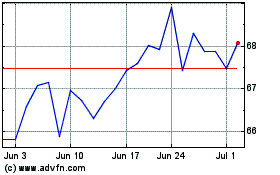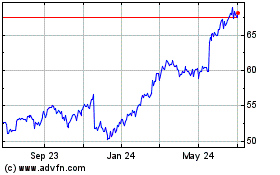Obstacles Remain in Talks to Settle Wal-Mart Bribery Probe
January 27 2017 - 3:18PM
Dow Jones News
By Joann S. Lublin, Aruna Viswanatha and Sarah Nassauer
Wal-Mart Stores Inc. tried and failed to settle a
foreign-bribery probe that has stretched for five years and cost
the company more than $820 million, according to people familiar
with the federal investigation.
In the final weeks of the Obama administration, the world's
largest retailer and U.S. officials weren't able to agree on a deal
before Donald Trump's inauguration, people familiar with the matter
said. "Wal-Mart and the government are very far apart in terms of a
settlement, " one of the people said Thursday.
The Justice Department and Securities and Exchange Commission
have been investigating allegations that Wal-Mart violated the
Foreign Corrupt Practices Act by paying bribes to foreign
government officials as it expanded around the word. The talks are
intended to settle any charges that would arise from the probe.
Wal-Mart has acknowledged the government probes and said it is
cooperating with them.
Discussions stalled over several issues beyond the size of
potential penalties Wal-Mart would have to pay. The people familiar
with the probe said one major sticking point has been Wal-Mart's
eligibility to continue accepting food stamps in its 5,300 Wal-Mart
and Sam's Club stores in the U.S. after a settlement is
reached.
A company that pleads guilty to a federal crime can lose its
right to win government contracts -- a penalty that could block
Wal-Mart from the $71 billion food-stamp program. The retailer, one
of the largest sellers of groceries, is also one of the biggest
beneficiaries of food-stamp spending.
Another sticking point in the talks was a government demand to
assign an independent monitor to watch the retailer's behavior, a
request typical in large settlements for violations of the Foreign
Corrupt Practices Act. Wal-Mart has rejected the demand: Wal-Mart
executives "won't take a monitor," one of the people said, because
the retailer believes it has already toughened its compliance
efforts.
The two sides could reach a compromise where the Wal-Mart
board's audit committee reports potential settlement compliance
issues to the government, the people said.
The Justice Department and SEC investigations were largely
driven by a 2012 series of articles in the New York Times
portraying details of possible misconduct at Wal-Mart in Mexico.
The investigation spread to other regions where Wal-Mart does
business, including Brazil, India, and China. A final settlement is
expected to cover multiple countries, the people said.
Wal-Mart efforts to reach a deal with U.S. officials intensified
after the November election. Its lawyers held talks with the
government "but then they died down," one of the people said, as
Obama officials prepared to depart.
The two sides have also argued over how many stores benefited
from alleged misconduct, what time period is relevant and how to
calculate profits from those stores, the people said.
The loss of food-stamp shoppers would be a blow to Wal-Mart,
which each year receives some 18% of the money spent through the
Supplemental Nutrition Assistance Program, or SNAP. That
represented about $13 billion in sales last year.
Both sides have considered ways to craft a settlement that would
allow Wal-Mart to continue accepting food stamps, the people said.
One option would be for the retailer to admit to a lesser charge
that wouldn't trigger the punishment, they said.
The changeover to the Trump administration isn't likely to
affect the rank-and-file investigators on the case, the people
familiar with the investigation said. But it does usher in a
different viewpoint at the top.
President Trump criticized U.S. efforts to prosecute foreign
bribery cases back in 2012 in response to a question about the
Wal-Mart investigation. "Let Mexico, or let China, or let these
other countries prosecute...It's a horrible law, and it should be
changed," Mr. Trump said in a 2012 interview on CNBC. "I mean we're
like the policemen for the world. It's ridiculous."
Meanwhile, the Supreme Court is set to take up a case later this
year that would affect how the government calculates one aspect of
FCPA penalties. The SEC has said there is no time limit on the
period for which it can calculate profits derived from illegal
conduct.
Most courts have agreed with the SEC's interpretation, but the
11th Circuit Court of Appeals said in 2016 that a five-year statute
of limitations applies, an understanding that could limit the size
of a penalty against Wal-Mart.
(END) Dow Jones Newswires
January 27, 2017 15:03 ET (20:03 GMT)
Copyright (c) 2017 Dow Jones & Company, Inc.
Walmart (NYSE:WMT)
Historical Stock Chart
From Mar 2024 to Apr 2024

Walmart (NYSE:WMT)
Historical Stock Chart
From Apr 2023 to Apr 2024
